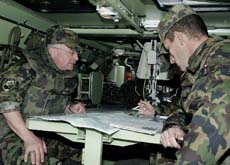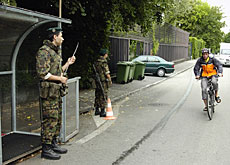Boom makes Swiss optimistic about future

The buoyant economy has had a positive effect on Swiss society – it has made residents feel more optimistic about the future, a study says.
The Security 2007 survey, published by Zurich’s Federal Institute of Technology, also found that the Swiss are less afraid of a terrorist attack than they were last year.
The key findings of the annual study presents a general mood of optimism among the population.
According to the institute’s Centre for Security Studies (CSS), 79 per cent of the Swiss surveyed – an increase of nine per cent compared to last year – are confident about Switzerland’s future and are not as pessimistic as they were about the situation globally.
“It’s normal during an economic boom that optimism increases. That’s the case this year as it was in 2001,” one of the authors of the report, Karl Haltiner, told swissinfo.
Surprising at first glance is the growing trust the Swiss have in their government, since disputes among members of the seven-member cabinet are increasingly carried out in public.
However, Haltiner believes the government is often given credit when things go well economically. This was mirrored in the fact that most people back the government’s policy to remain out of the European Union and to continue to develop ties through bilateral accords.
Nearly unchanged was the percentage of people (86 per cent) who said they were convinced they live in a safe country. Only 12 per cent said they felt they could be victims of a terrorist attack – half as many who saw an immediate danger following the Madrid bombing three years ago.
Terrorism
But four out of ten believed terrorists could still carry out a strike in Switzerland.
“The figures are far below the European average. We [Swiss] have been spared from attack up to now and there is a higher ratio of fear in Spain and Britain [countries hit by previous attacks] and even in Germany,” Haltiner said.
“We have asked people about the impact of neutrality and they say they don’t believe [the policy] is protecting Switzerland from terrorism.” But nine out of ten did not want to see the government give up its neutral stance.
In order to prevent an eventual terrorist attack, three-quarters of the respondents said they would accept more stringent baggage controls at airports and an increase in the number of police patrolling the streets, but most were opposed to identification checks at public buildings or phone tapping.
If a robust economy increases a sense of security, it decreases the belief people have that the army is necessary to protect them.
Sixty-one per cent of the Swiss see the armed forces as “necessary” – a drop of 14 per cent compared to 2006.
swissinfo with agencies
The 2007 survey is based on interviews with 1,200 people across Switzerland in January and February.
The study has been published by Zurich’s Federal Institute of Technology on an annual basis since 1999.
The Center for Security Studies (CSS) is an academic institute specialised in research, teaching, and the provision of services in international and national security policy.
As in previous years, the large majority of the Swiss feel “very” or “rather” safe (86%).
79% are optimistic about Switzerland’s future – a 9% increase on 2006.
The optimism is reflected in increased trust in the Swiss government, parliament and especially in the economy.
Fewer respondents (46%) consider the global political situation to be “somber and tense” – a 7% drop from 2006.
90% of those surveyed still cling to the notion of “neutrality”. High value is attached to solidarity and identity as functions of neutrality.

In compliance with the JTI standards
More: SWI swissinfo.ch certified by the Journalism Trust Initiative










You can find an overview of ongoing debates with our journalists here . Please join us!
If you want to start a conversation about a topic raised in this article or want to report factual errors, email us at english@swissinfo.ch.